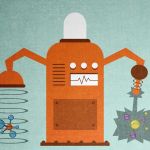Article Summaries
K2-18b: A Habitable Zone Exoplanet 124 Lightyears Away
K2-18b: A Habitable Zone Exoplanet 124 Lightyears Away
In a paper published today (27 Feb), researchers from the Institute of Astronomy revealed findings on the interior and atmospheric composition of exoplanet K2-18b, orbiting an M-dwarf (‘low-mass’) star in the habitable zone, only 124 lightyears away from Earth.
Picture from Frontier Development’s Elite: Dangerous.
Picture from Frontier Development’s Elite: Dangerous.
Greater Efficiency from Less Ordered Solar Cells
Greater Efficiency from Less Ordered Solar Cells
Cantabrigian researchers have suggested that solar cells can have increased efficiency if their chemical compositions are less ordered.
An Artifical Leaf
An Artifical Leaf
Researchers from the Department of Chemistry announced the development of a new method of syngas production, paving the way for greener production practices.
Novel Solid State Alternative to Commercial Cooling
Novel Solid State Alternative to Commercial Cooling
Material science researchers at the University of Cambridge have recently reported the development of a new design of electrocaloric (EC) cooling devices which works over a wider and more usable temperature range and a larger effect than previous proposals.
Nausea-free AR
Nausea-free AR
Cambridge researchers at the Centre for Photonic Devices and Sensors and their colleagues from Huawei Technologies Duesseldorf GmbH have developed a new AR headset that eliminates nausea during use and improves image quality and the field of view, with implications for numerous industries.
Retrotransposon-induced Tomato Evolution
Retrotransposon-induced Tomato Evolution
Cambridge researchers have shown that genetic elements activated by drought can induce positive changes in major crops: a potential method for future crop improvement and a valuable tool against world hunger.
Predicting Organic Syntheses
Predicting Organic Syntheses
Congratulations to Dr Alpha Lee, one of last year’s speakers, and his co-researchers, which included Dr Phillipe Schwaller, at the Cavendish Laboratory with Dr Alpha Lee, and Dr Christopher A. Hunterford and PhD student Peter Bolgar at the Department of Chemistry, for their two remarkable papers reporting on the development of a new model which predicts, with over 90% accuracy, the outcomes of various organic synthesis reactions, the sort that might be involved in medicinal drug discovery.



